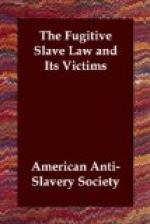[In a letter, dated Macon, Georgia, Nov. 11, John Knight gives a particular account of the proceedings and experiences of himself and his friend Hughes, on their then recent visit to Boston for the purpose, to quote his own language, “of re-capturing William and Ellen Craft, the negroes belonging to Dr. Collins and Ira Taylor.” Willis H. Hughes also published his statement.]
New Albany, Indiana. A woman and boy given up, and taken to Louisville. They were so white that, even in Kentucky, a strong feeling arose in their favor on that ground. They were finally bought for $600, and set free.
ADAM GIBSON, Philadelphia, December 21, 1850. Surrendered by Edward D. Ingraham, United States Commissioner. The case was hurried through in indecent haste, testimony being admitted against him of the most groundless character. One witness swore that Gibson’s name was Emery Rice. He was taken to Elkton, Maryland. There, Mr. William S. Knight, his supposed owner, refused to receive Gibson, saying he was not the man, and he was taken back to Philadelphia.
What compensation has the United States Government ever made to Adam Gibson, for the injurious act of its agent, Ingraham? Had not the Slaveholder been more honorable than the Commissioner or the makers of the Fugitive Law, Gibson would have been in Slavery for life.
HENRY LONG, New York, December, 1850. Brought before Commissioner Charles M. Hall, claimed as the fugitive slave of John T. Smith of Russell County, Virginia. After five or six days’ proceedings, there being some doubt of the Commissioner’s legal right to act, the alleged fugitive, Long, was taken before Judge Judson, District Judge of the United States. The Castle Garden Union Safety Committee retained Mr. George Wood in this case, as counsel for the slave claimant. Long was surrendered by Judge Judson, and taken to Richmond, Virginia. Judge J. was complimented by the Washington Union as “a clear-headed, competent, and independent officer, who has borne himself with equal discretion, liberality, and firmness. Such judges as he,” continues the Union, “are invaluable in these times of turmoil and agitation.” At Richmond, Long was advertised to be sold at public auction. On Saturday, January 18th, he was sold, amid the jeers and scoffs of the spectators, for $750, to David Clapton, of Georgia. The auctioneers (Pullam & Slade), in commencing, said there was one condition of the sale. Bonds must be given by the purchaser that this man shall be carried South, and that he shall be kept South, and sold, if sold again, to go South; and they declared their intention to see the terms fully complied with. Long was subsequently advertised for sale at Atlanta, Georgia.
Near Coatsville, Chester County, Penn. On a writ issued by Commissioner Ingraham, Deputy Marshal Halzell and other officers, with




